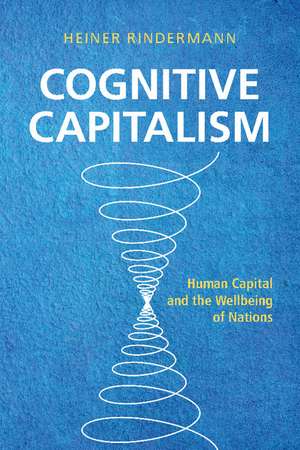Cognitive Capitalism: Human Capital and the Wellbeing of Nations
Autor Heiner Rindermannen Limba Engleză Paperback – 14 feb 2018
Preț: 370.41 lei
Nou
Puncte Express: 556
Preț estimativ în valută:
70.88€ • 74.19$ • 58.99£
70.88€ • 74.19$ • 58.99£
Carte disponibilă
Livrare economică 10-24 martie
Preluare comenzi: 021 569.72.76
Specificații
ISBN-13: 9781107651081
ISBN-10: 1107651085
Pagini: 592
Ilustrații: 57 b/w illus. 47 tables
Dimensiuni: 150 x 227 x 25 mm
Greutate: 0.92 kg
Editura: Cambridge University Press
Colecția Cambridge University Press
Locul publicării:New York, United States
ISBN-10: 1107651085
Pagini: 592
Ilustrații: 57 b/w illus. 47 tables
Dimensiuni: 150 x 227 x 25 mm
Greutate: 0.92 kg
Editura: Cambridge University Press
Colecția Cambridge University Press
Locul publicării:New York, United States
Cuprins
1. Large wealth differences across time and nations; 2. The wellbeing of nations; 3. Human capital, cognitive ability and intelligence; 4. International ability differences and their development; 5. Why some are richer, freer and more democratic; 6. History, culture and the burgher-civic world; 7. Why cognitive factors are important – a theory of cognitive capitalism; 8. The impact of cognitive-intellectual classes; 9. Methodological research problems and solutions; 10. Causes for national and historical differences in cognitive ability – and reciprocal effects; 11. Global models for education, cognitive capital, production, wealth and wellbeing; 12. Challenges of future development and first predictions; 13. Models for cognitive and wealth development in twenty-first century; 14. Summary, comparisons and suggestions; References.
Recenzii
'In an era where most intelligent people are poorly informed about intelligence, Heiner Rindermann's book is especially welcome. The title of the book effectively summarizes what is most crucial for the economic well-being of a people: Cognitive Capitalism. The author, who grew up in East Germany at a time when the Berlin Wall still stood, is the best-qualified person to integrate intelligence research with the literature on the determinants of economic growth.' Gregory Christainsen, Professor Emeritus, California State University, East Bay
'Cognitive Capitalism is a tour de force of the science of country level differences in cognitive ability. It raises important questions about the role of cognitive ability for culture, health, economics, education, technology, immigration and government. The theory of cognitive capitalism promises to inform our understanding of country level differences just as Darwin's theory informed our understanding of individual differences.' Thomas R. Coyle, University of Texas, San Antonio
'Cognitive Capitalism is a tour de force of the science of country level differences in cognitive ability. It raises important questions about the role of cognitive ability for culture, health, economics, education, technology, immigration and government. The theory of cognitive capitalism promises to inform our understanding of country level differences just as Darwin's theory informed our understanding of individual differences.' Thomas R. Coyle, University of Texas, San Antonio
Notă biografică
Descriere
This book studies cross-country differences in cognitive capital, exploring how levels of education are linked to a nation's economic development.
